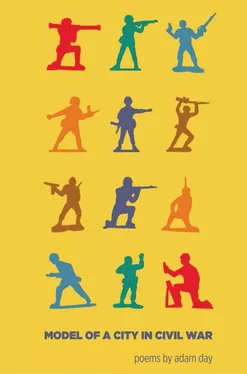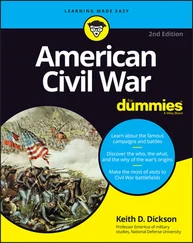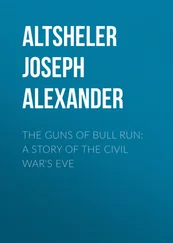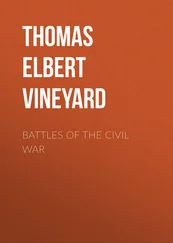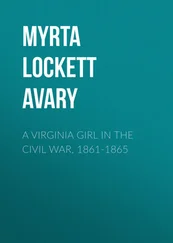Adam Day - Model of a City in Civil War
Здесь есть возможность читать онлайн «Adam Day - Model of a City in Civil War» весь текст электронной книги совершенно бесплатно (целиком полную версию без сокращений). В некоторых случаях можно слушать аудио, скачать через торрент в формате fb2 и присутствует краткое содержание. Город: Louisville, Год выпуска: 2015, ISBN: 2015, Издательство: Sarabande Books, Жанр: Поэзия, на английском языке. Описание произведения, (предисловие) а так же отзывы посетителей доступны на портале библиотеки ЛибКат.
- Название:Model of a City in Civil War
- Автор:
- Издательство:Sarabande Books
- Жанр:
- Год:2015
- Город:Louisville
- ISBN:978-1-941411-06-3
- Рейтинг книги:5 / 5. Голосов: 1
-
Избранное:Добавить в избранное
- Отзывы:
-
Ваша оценка:
- 100
- 1
- 2
- 3
- 4
- 5
Model of a City in Civil War: краткое содержание, описание и аннотация
Предлагаем к чтению аннотацию, описание, краткое содержание или предисловие (зависит от того, что написал сам автор книги «Model of a City in Civil War»). Если вы не нашли необходимую информацию о книге — напишите в комментариях, мы постараемся отыскать её.
from a dumpster past the flooded
foundations of an unfinished
high-rise, an old woman catches
a pigeon in the folds of her dress
the dead smile and rise from swimming
pools or stand at attention
on stamps. The landscape can’t believe
it’s real — there is no ground
beneath it, like what mirrors do. Adam Day
Boston Review
Kenyon Review, American Poetry Review, AGNI
Iowa Review
Model of a City in Civil War — читать онлайн бесплатно полную книгу (весь текст) целиком
Ниже представлен текст книги, разбитый по страницам. Система сохранения места последней прочитанной страницы, позволяет с удобством читать онлайн бесплатно книгу «Model of a City in Civil War», без необходимости каждый раз заново искать на чём Вы остановились. Поставьте закладку, и сможете в любой момент перейти на страницу, на которой закончили чтение.
Интервал:
Закладка:
THE LEAVING
There is the rain on the copper
roofs, there is the click-shuff
of red heels on concrete, the voice
of a ruddy-faced neighbor
above, calling after her husband.
In their apartment, the pillows
still sleep-dented and sour
with breath. The headless straws
of aster stalks hang above
the credenza, beside the battered
front door. There are the bridge’s
rust-water icicles, its bands
of moss seaming a forgotten
cobblestone sidewalk. There is
the river in thistle-gray cowlicks,
and the husband above it, deciding.
WINTER INVENTORY
I look out at the river in cakes of ice
sliding violently over one another,
speaking a language remembered
from another of earth’s ages, and almost
understand that speech as human, some
body of absence struggling with itself
under bridge lights. And remember
a winter spent driving a heatless car
with a patchwork quilt thrown over my legs
until more than a ghost of warmth existed
and I was alone on a country road under
a nothing sky with stubbled fields
and telephone poles flashing past
and the sense that if I closed my eyes
I might remain sitting, speeding along,
no car, and soon no road, and perhaps
the trees evaporate and the telephone polls
sink deep into hard earth and nothing
then but myself, and a river far off, and the name
of someone, and still no better understanding.
WATER FROM THE SAME SOURCE
Knuckles stripped
to a skinned goat’s head—
the nearly vacant fingers
of barge workers; when you left
I was wire-jawed
and shut-in from surgery.
Going back out, sinking
into subway tunnels, I was reminded
how easy it is to forget the world
is inhabited mostly by others.
I’ve got three joints
in my shirt pocket, and we’re kicking ash
from our shoes in the pointless
heat, smashing a ditch’s discarded bottles
in the night, so that their wreck
spreads in cinders over the blacktop
like silage spilled into moonlight, like
something you might want.
ELEBADE
When I woke
I felt fine for a minute.
Set the table, saw myself
rise and go. First rise
and stand, holding
the table. Then sit
again. Then go. Start
to go.
Motionless pines
we’d built, stirred.
Blind October
inching up. No wife
raising hell
when she came. Empty
or almost empty beast.
Bull down. Bad heart.
BLIND ATTIS
Her lover was a black bear
whose empty eye-sockets rattled
with pebbles. And though
he should not have existed, she believed
as she believed in stones that fell
from high places. She knew
when he had been with others
because he loped through the pines
and lindens smelling like a mudbound
whale. One night under
the stars strung out behind a haze
of brushfire, he slept clutching
a claw-scratched rosary.
And she climbed, brushing
her stark nakedness along his coarse
length, to the soil-rimmed holes
in his head and found no manic
bestial glow, but the dark
behind cracked lantern slides. And he rose
and like a husband he cut her—
“I will love you more when I am older…
if I let you live,” she breathed
into his pricked ears. Each night
she took a bit more blood
from him, until he woke
under a crooked moon
and reached to maul her crouching
black figure. But she had taken
his paws, and biting, she whispered
into the folds and long darkness
of his ear, “If you return again it will be
through the eyeholes of birds,” for whom
she left the pink jigsaw of his hatcheted
remains steaming in the morning.
SMOKE
I dreamt your childhood wound, softened
in bathwater, had reappeared,
an ochre-blue puncture at the heel—
dimpled star spreading to uneven
points. It held in its shadow
a leaf stem, beetle-brown. I pulled it
from your foot and it brought more leaves
littering the bath. Soon you were
a tub of dogwoods and blackthorns
I gathered and carried out
to the grass between the crocuses
where I stood over you, bit of earth fleeing
into smoke, spelling nothing above the yard.
TIME AWAY
A female cardinal has taken up a limned branch
but her prey has flown inside, with me. Tonight, on the phone
I fought again with my son’s mother. She has become
so used to my cruelty that it is simply questioned
and assessed. I used to surprise myself. A friend reads
a story I’ve written, finding the main character “deplorable.”
There are a lot of things I don’t tell him. Earlier,
I passed the ostensibly intelligent woman with pock-marked
cheeks, who works at the bookstore down the block, who
has lived here her whole life, so whose only remaining
chances are those who move here, or return after
years away. Out back, sheaves of silverweed and Indian pipe
sink and buckle into mud. During grad school there was a string
of suicides in the school library. One jumper from the atrium
fell silently to land at the feet of my student. She told me
about his breathing, was nervous about taking some time away
from classes, and came to ask if that might be okay. “Yeah,”
I said, “that would be okay.” I’ve moved and come back so many
times. By December the backyard will be a moist cushion
of decay, bits of spider, robin, and mouse carcasses. One day,
I’ll pack up what little I own that’s unbroken and move
to Montana. For now, I put off going home — there is
nothing but empty conversation, and the historical moment.
The first time my father got in my face, and for once
I came closer, I turned away only to throw
an antique dresser across the bedroom, before inviting him
to hit me — all he could do was threaten to call the cops, the brittle
embarrassing admonishment of middle-age. I feel sure I won’t
find anyone, now. I’ve settled into that a bit. And I find myself
attracted more and more to pregnant women — I’m familiar
with their bodies — the solid, outsized stomachs, and darkened
nipples, and maybe I think this time I could get it right.
THE CHILDREN, THE GRASS
Here are the children, tall as knee-high grass,
who will climb the mornings into bed with you
to make the day loose and foolish, and the sea
not so far away. They are soft as warts of moss.
And still they are ignorable, which suits.
It is not easy to know how best
to move yourself from one place
to another but they will help.
They rinse your arms, feet and face
with seawater, provide a pocketful of almonds.
UNDERCOVER
The train to Trieste — Schiele, fifteen,
hoisting his sister’s
suitcase onto the rack, a wash
of cold light flushing her face like breath
traveling across
glass. Lost in fog, the windows
would not give their faces back. Her sleeping feet
brush the skin above
his socks, and outside, the honeysuckle
like a pattern of blood repeating itself
around a fence.
Lincoln, depressed, flickering
about the edges of the woods for weeks—
his eyes’ snow-lashed
halo, and his gun — like his uncle Mordecai,
a hermit who kept a dog named Grampus
and hundreds
of pigeons — here are their elaborate houses
with gables and columns, far from the double-bed
above a general store
where Joshua Speed and long Ishmael lie
for four years like brothers. Far from what will swell
and blacken
at Gettysburg. In the glow of low fire on charred brick
sweat-pale Adolf Schiele is laid out,
in a railway
official’s dress uniform, syphilitic, a dagger
at his side. Not burning the family’s stocks
and bonds. Not storming.
Not breaking down the door to a lightless room
that hides Egon and his sister, his first and best
model, simply
developing film. Plaster cast brains, hydrocephalic
skulls, and weight scales — Alphonse Bertillon comes
every workday
to the Laboratoire Anthropologie , to his
father’s skeleton hanging from the wall
like some mobile
of the Pleiades, as if the bones’ equilibrium
could keep him from slipping beyond reach. Young
urchins, three sisters,
sit in Schiele’s studio. They sleep, comb hair,
pick their ears, pull at dresses — the raw mottled
flesh of inconvenient
limbs, bruising, impassive, the vent of ribs beneath
thin skin. John Brown had the eyes of a goat,
and beating
his sons, forced them to strike back
as often as he struck. Brown called his killing
“work,” watching
in the late moonlight while his sons
and others knocked as lost travelers on the nightdoors
of anti-abolition families
and cut their men to pieces — like opening
a seed-bag — while the women slept, the ground alive
where bodies fell, black
scars on dark grass, and when it rained the smell
came into the houses. A child
with the shambling
gait of a circus bear, Clyfford Still’s family
in South Dakota was digging a well and they needed
someone to go down
to see the condition of the pit. It smelled like
the faint decay of overripe almonds—
the way his father
smelled in from the rain, the deep creases of his hands
and coveralls traced with night-crawler soil. “They put
a rope around my ankle,
tied a simple knot, and dropped me down head first.”
Интервал:
Закладка:
Похожие книги на «Model of a City in Civil War»
Представляем Вашему вниманию похожие книги на «Model of a City in Civil War» списком для выбора. Мы отобрали схожую по названию и смыслу литературу в надежде предоставить читателям больше вариантов отыскать новые, интересные, ещё непрочитанные произведения.
Обсуждение, отзывы о книге «Model of a City in Civil War» и просто собственные мнения читателей. Оставьте ваши комментарии, напишите, что Вы думаете о произведении, его смысле или главных героях. Укажите что конкретно понравилось, а что нет, и почему Вы так считаете.
